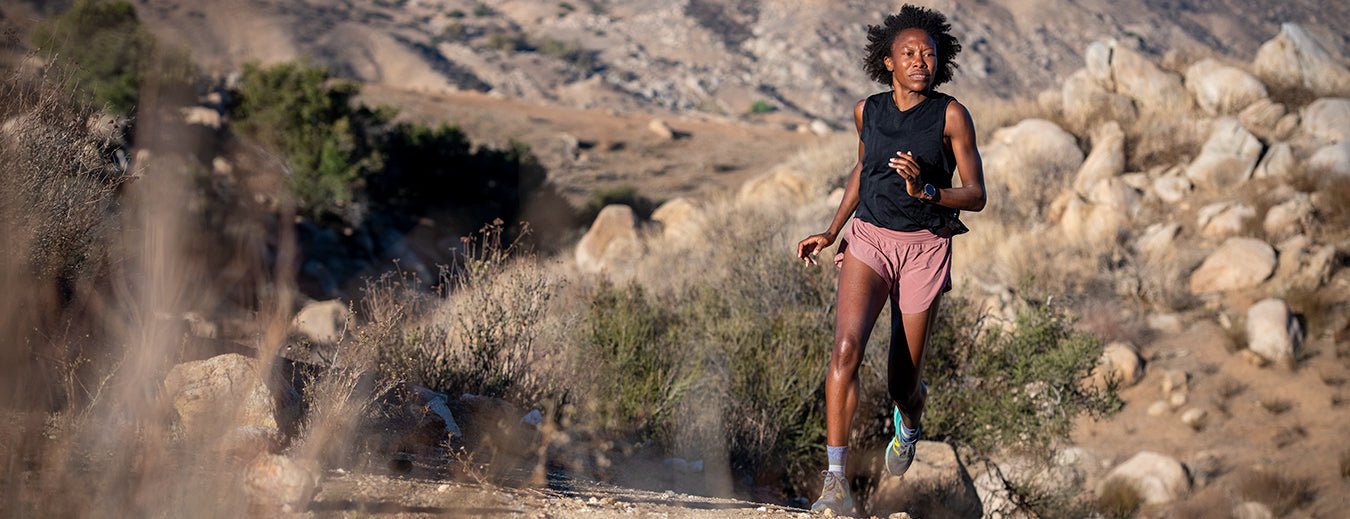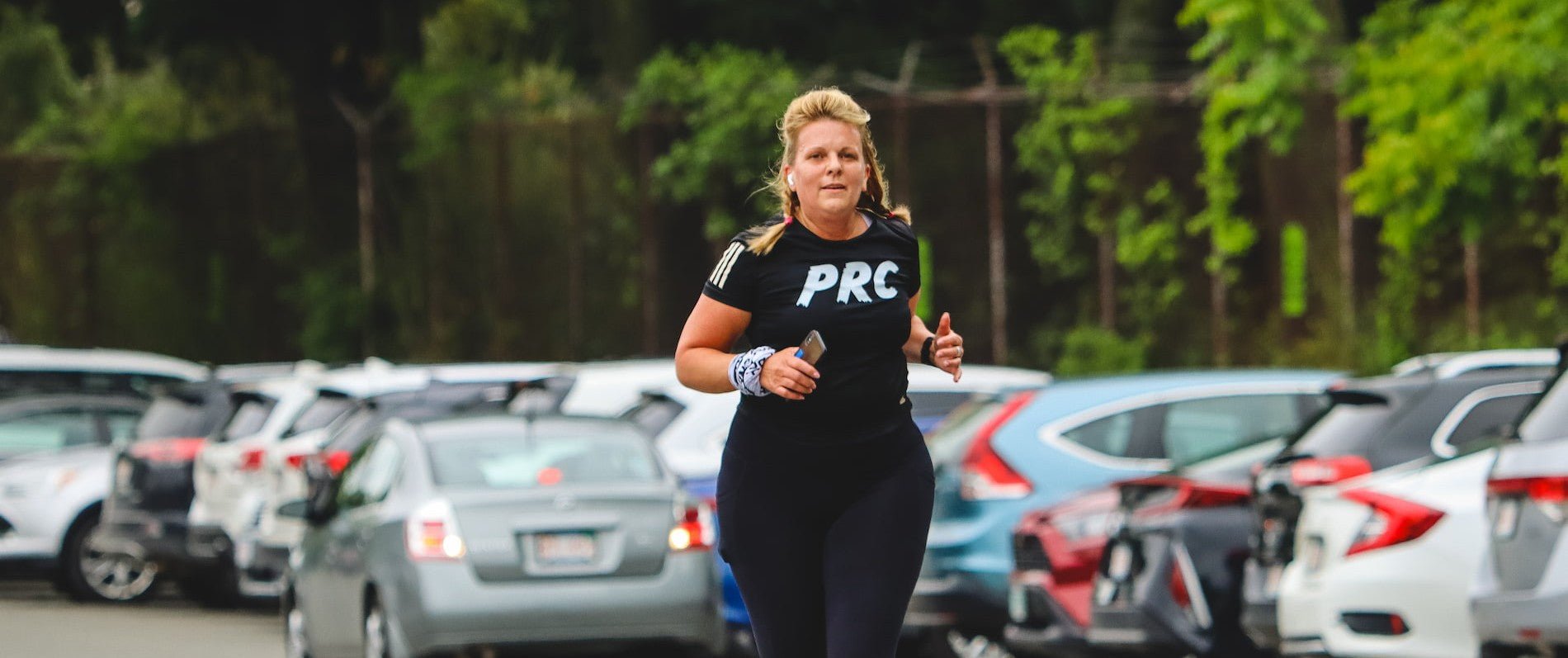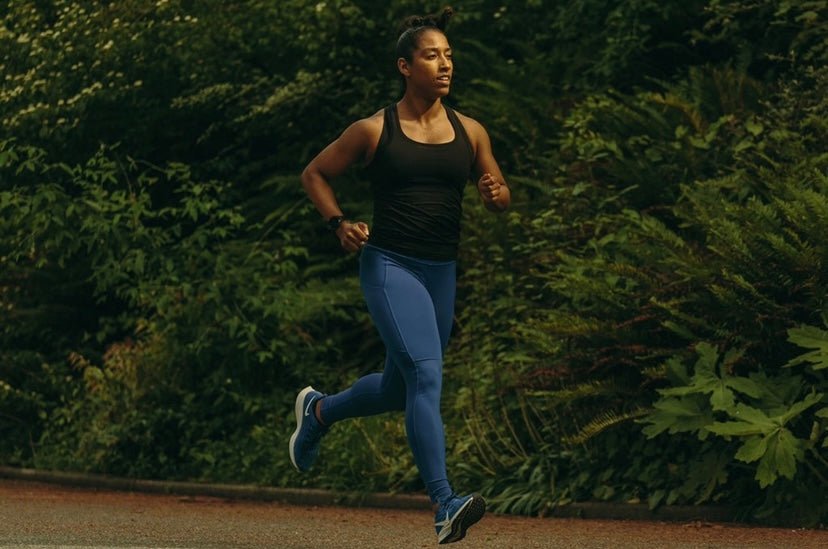The co-founder of Club Seattle Runners Division describes her own difficulties navigating certain spaces - and why it inspired her to start creating her own.
Throughout her life, Ashley Davies has struggled to find spaces that she felt comfortable in. It’s a feeling that other people of color might also recognize - the simple absence of people like them in the circles in which they live and work.
But anyone can find themselves in a space where they feel like they don't quite belong: spaces occupied by people of a certain color, a certain level of privilege, or an unattainable level of ability (be that academic, athletic or otherwise).
Eventually Ashley learned that, when she found herself in a space where she felt uncomfortable, she needed to move out of it - but she also recognized that not everyone has that option.
So Ashley created her own spaces.

Club Seattle Runners Division (CSRD) is an inclusive running community that meets twice a week in Ashley’s home city of Seattle. It’s a space where people from all areas of life can walk, run and connect with one another.
We sat down with Ashley to hear more about the experiences, the people and the other running crews that inspired her to co-found CSRD.
"Private School was an awful experience for me… I felt like folks had a lot of privilege"
"When my partner’s friends ask him about me, they assume the running crew is a full-time job," laughs Ashley. "Whereas I always feel like there are more hours I could be doing!"
In reality, being a co-founder of CSRD is just one example of the work Ashley does to create connections and champion inclusivity in Seattle. Ashley has worked in education for the last 10 years, with a focus on urban education. A lot of her work centers on trying to understand what impacts black and brown students' ability to have access to opportunities outside of school. She’s also a Lululemon Ambassador and is on the board of the non-profit Girls on the Run.
Ashley admits to being very organized and relies on "processes, ways of doing things." However the work she does also requires a certain entrepreneurial spirit - something she exhibited at a young age growing up in Flemington, New Jersey.

"When I got to middle school, I created my own snack shop at the bus stop," Ashley explains. "I would take my snacks out there, and when the elementary kids came through, I'd be waiting with my cash box!"
"When I was a kid growing up, I was super outgoing - the center of everything in the neighborhood," she continues. "But I can be reserved until I start to feel comfortable in a place."

At age 11, Ashley suddenly found herself removed from the comfortable place she’d grown up in. Ashley's parents got a divorce and she went to live with her Mom in Virginia. Her Mom hoped that Ashley would find the transition easier if she went to private school, but Ashley struggled to feel at home in this new space.
"Private school was an awful experience for me," Ashley recalls. "I felt like I didn't fit in and I felt that folks had a lot of privilege. There was the combination of new place, new school, my body changing… I didn’t make it past one year."
"There was a dynamic from that period that I sometimes experience as an adult," Ashley continues.
"I won a student award - and people couldn't reconcile the fact that I was doing so well and me feeling like I didn't belong. I think that’s something that people miss when we think and talk about mental health. It’s why you hear people say ‘everything seemed fine with them'."
"I started running… I thought it would be a way to meet people and get connected in some way."
After a year living in Virginia, Ashley moved back in with her Dad and continued high school in New Jersey. It was there she started running for the first time.
"I started running because I thought it would be a way to meet people and get connected in some way," Ashley explains. "So I joined the cross country club. I felt like I had to learn how to re-connect with people."

"My first experience running cross country was terrible! I was super eager, but very reserved because I didn't really know people," she continues. "But the coach thought I had talent, so the next summer I trained a lot and came back a lot faster the next year."
In compiling these running stories, we don’t hear of many people of color who go straight into cross country or distance running at that age. Whether by personal choice, or due to decisions made by coaches, most end up doing track. While this wasn't something that Ashley noticed at the time, she did think about in subsequent years.
"There was probably something inside me that recognized that there were no people like me competing in the races I was competing in," admits Ashley. "But really I was just focused on myself and my development."
"It was not until college that I realized my blackness felt separate from my personal interests."
We explore this a little further and learn that, before she was born, Ashley's parents moved out of their home in Brooklyn to a new neighborhood. This meant that growing up, Ashley was able to attend good schools, but at the expense of being able to connect with her culture.
"Growing up in a neighborhood that's predominantly white, being the only Black family, and then going to a school where a lot of my time and interests were dominated by white people - I feel that I didn’t have the ability to identify and connect with my blackness."

While this realization began to form in college, it was a subject of interest to Ashley even in high school.
"In high school I did an independent study around the black/white test score gap," recalls Ashley. "That was my initial interest in education - I started pretty young!"

"I went to a pretty big school, with over 3000 students, and there were maybe 50 black students there in total. It's a pretty small percentage."
"I was feeling burned out and I knew I needed to do something different."
In her first year of college, Ashley still wanted to run, but struggled with the intensity of being at a large school with a Division 1 track & field program.
"Cross country and track felt like it was my whole life and I didn't want that experience," says Ashley. "I was in an all-white team and spent all my time with them."
Ashley transferred to a smaller liberal arts college on the outskirts of Philadelphia. She ran there for three years and was able to find a balance between running and the other things that were important to her.

Then, after completing a two year Masters program in Pittsburgh, Ashley got a job at the New York Department of Education, working in an innovative team who were responsible for transforming underperforming schools. It was in New York that Ashley experienced community running culture for the first time.
"I spent three years in New York and found Nike Run Club in the second year", recalls Ashley. "I got into pacing - and you had to work at the store in order to pace. So every weekend I would work in the store and then I would be the pacer for a 'Morning Mile' or track workout. This was on top of my 9-5, which was more like 8-9!"
Of course, we already know that Ashley can manage a formidable amount of work and responsibility. However this sounds like an unsustainable lifestyle - and ultimately it was.
"I was feeling burned out and I knew I needed to do something different," Ashley admits. "Unless you make a ton of money in New York, or you just live off the culture… it’s hard to be in-between."
So Ashley took the opportunity to move to Seattle and continue working in education there - but not before checking out some of New York's running crews in Harlem, Uptown and the famous Bridgerunners.
"What's special is that it's a space where all different people can be together"
Upon moving to Seattle, it wasn't long before Ashley connected with the city's running communities - and in doing so met CSRD co-founder David Jaewon.

"David and I met through Nike Run Club Seattle," Ashley explains. "When I moved to Seattle the first thing I figured out was where I was going to run and who I was going to run with."
"I ran with the Nike Run Club and met a lot of people - meanwhile David was a freelance photographer who took photos for the club."
"Then at one point the club took a break for the winter. They said they were going to come back and we were waiting and waiting… but heard nothing at all."
In pulling their running clubs out of cities like Seattle, Nike had left a void. And in their absence, people like Ashley, David and third co-founder Miran decided to do their own thing.

"David is more creative than I am," explains Ashley. "He thought about the name, the visuals, what it looks and sounds like."
"Then I invited every runner I knew over to my apartment. I said to everyone 'we're going to run three miles down the street, run back, then have some snacks and chat.' And that was the beginning of our weekly run!"
5 years on, the members of Club Seattle Runners Division are still hitting the streets every Saturday morning and Monday evening. Running is in their name, running is what they do - but fundamentally the group exists to provide a space. One that anyone can be comfortable in and feel that they are a part of.
"Some people have never run before - they start running, or walking or just general movement with us," Ashley explains. "Then we have other people who have run marathons, ultras, trails - any day, any weather.
"What's special is that it's a space where all these different people can be together," she continues. "We all have things that we can share or learn from, regardless of how much experience we have in a specific area of life. Running just happens to bring us together."
The community has grown organically - and its members value it so highly simply because it’s a way to bring people together in Seattle.

"Despite the fact that Nike was this big brand with the money and resources to create experiences - when the community came together, we realized that we didn’t need any of the flashy things that a big brand was able to do."
"I have spent a part of my life feeling disconnected… and I don’t want that experience for anybody"
As our chat with Ashley comes to an end - we're keen to understand what drives her. What is it that enables her to pour so much into the community, both in a personal and professional capacity?
"People need connection," says Ashley. "People talk about 'finding your purpose' - but you can't do that until you feel connected to something."
"I have spent a part of my life feeling disconnected and I don't want that experience for anybody," she continues.
"Today I navigate my life with the outlook that you should be in a space that allows you to be you. If the space you’re in doesn’t do that, then move on."

"I was fortunate enough to be able to make those choices - others aren't so fortunate. That's why I think the spaces we create in running crews are super important. We need to create those spaces and actively welcome others in. We can’t just stand there and say 'you're welcome to come'. Existing is the minimum."
"That's what underpins the work I do and the areas I pour myself into - from school systems to communities to running."
As for the future of CSRD - Ashley is committed to continuing to create spaces and experiences for people from all walks of life, but remains open as to how that manifests itself:
"CSRD has never had a fixed end point," Ashley reflects. "And I don't think we ever will have a fixed end point. We just need to keep learning, and keep building. That's it."
In the hands of Ashely Davies - committed, entrepreneurial and eminently inspiring - we're certain that CSRD will continue to positively impact communities in Seattle, whatever direction they take.
Sidney Baptista is a running coach, leader & activist who founded PIONEERS Run Crew in Boston. Ashley Davies is the co-founder of Club Seattle Runners Division and a Lululemon Ambassador.Read more

Iman Wilkerson gives us "The Run Down" on how she discovered the power of community running - and how her new app will make it even easier for others to connect with the growing running community.

Ange's story shines a light on the incredible power of running and community running - at whatever stage in life you're at. "I used to do Park Runs in the winter, back when I lived in the UK," sm...

